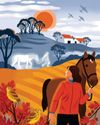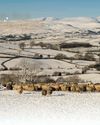يحاول ذهب - حر
The taste of England
October 2024
|BBC Countryfile Magazine
Amid pastures farmed by her family for more than four centuries, Mary Quicke is reviving forgotten dairy traditions to produce delicious Devon cheeses

After 57 years of practice, artisan cheesemaker Mary Quicke still considers herself a beginner. At surfing, that is: she isn’t as nimble as she’d like. But that is most definitely not the point. For her, time in the sea is play – and, having just returned from Cornish waves, she’s energised and exuberant as she shows me around the 1,090-hectare Devon estate of pasture and woodland farmed by her family since 1540.

Mary has played a pivotal role in the revival of true farmhouse Cheddar – her efforts recognised with an MBE – and she’s at the top of her game. “It’s magical: this is the first step of taking milk from a liquid to solid,” enthuses Mary, as she cuts and tastes a small slab of panna-cotta-like white curd, still warm from the vat. “It’s quite sweet, like a milk jelly. But in the pursuit of complexity, you can’t just have sweet – you need a bit of bitter, and that’s where lactic acid comes in. Big industrial cheesemakers make as much cheese in a day as we do in a year [about 200 tonnes], with no people on the production floor,” continues Mary, who regularly judges cheese competitions all over the world.
 “Our team brings attention and intention to the process – we’re trying to find the most lovely cheese in that vat of milk by using our senses and judgements.” She outlines three ‘flavour families’ in the Quicke’s portfolio of cheeses: buttery and caramelly; sharp, oniony and grassy; meaty, brothy and umami. The youngest three-month-old cheese is buttery, while the two-year-old vintage Cheddar has complex caramel notes.
“Our team brings attention and intention to the process – we’re trying to find the most lovely cheese in that vat of milk by using our senses and judgements.” She outlines three ‘flavour families’ in the Quicke’s portfolio of cheeses: buttery and caramelly; sharp, oniony and grassy; meaty, brothy and umami. The youngest three-month-old cheese is buttery, while the two-year-old vintage Cheddar has complex caramel notes. هذه القصة من طبعة October 2024 من BBC Countryfile Magazine.
اشترك في Magzter GOLD للوصول إلى آلاف القصص المتميزة المنسقة، وأكثر من 9000 مجلة وصحيفة.
هل أنت مشترك بالفعل؟ تسجيل الدخول
المزيد من القصص من BBC Countryfile Magazine

BBC Countryfile Magazine
Manors and meadows
This December marks 250 years since Jane Austen's birth. To celebrate, Jack Watkins ambles around Chawton, where the writer penned novels that changed fiction forever
7 mins
December 2025

BBC Countryfile Magazine
TOP 10 ROYAL RESIDENCES
Castles, palaces and stately homes open a window into the history and private lives of the British monarchy
9 mins
December 2025

BBC Countryfile Magazine
Your countryside
HAVE YOUR SAY ON RURAL ISSUES
1 mins
December 2025

BBC Countryfile Magazine
Community spirit
Rural pubs across Britain are closing at an alarming rate - but local people are fighting back to save inns that have been at the hearts of their villages for centuries. Vivienne Crow orders a pint
4 mins
December 2025

BBC Countryfile Magazine
Gift ideas for nature lovers
Find inspirational and thoughtful presents for all the family in our pick of top outdoor gear and a round-up of this year's best nature and wildlife books
2 mins
December 2025

BBC Countryfile Magazine
Toad numbers are in freefall.It's in our power to save them
After becoming engaged at Christmas in 1998, my new fiancé and I were confronted by an enormous toad on the way to meet the vicar.
2 mins
December 2025

BBC Countryfile Magazine
Conquer fell running
Infamously tough yet famously friendly, the sport of fell running will take your fitness to new heights amid the wildest landscapes. Here's our beginners' guide
3 mins
December 2025

BBC Countryfile Magazine
A glorious haunting
They lived in the same village and shared the same dreams – just 60 years apart.
6 mins
December 2025

BBC Countryfile Magazine
The big questions answered
Across the UK, but particularly in the southeast of England, giant and featureless buildings are springing up.
13 mins
December 2025

BBC Countryfile Magazine
Away in a manger
While most of us down tools and pick up the mince pies, a farmer's work doesn't stop for the festive break.
5 mins
December 2025
Listen
Translate
Change font size
